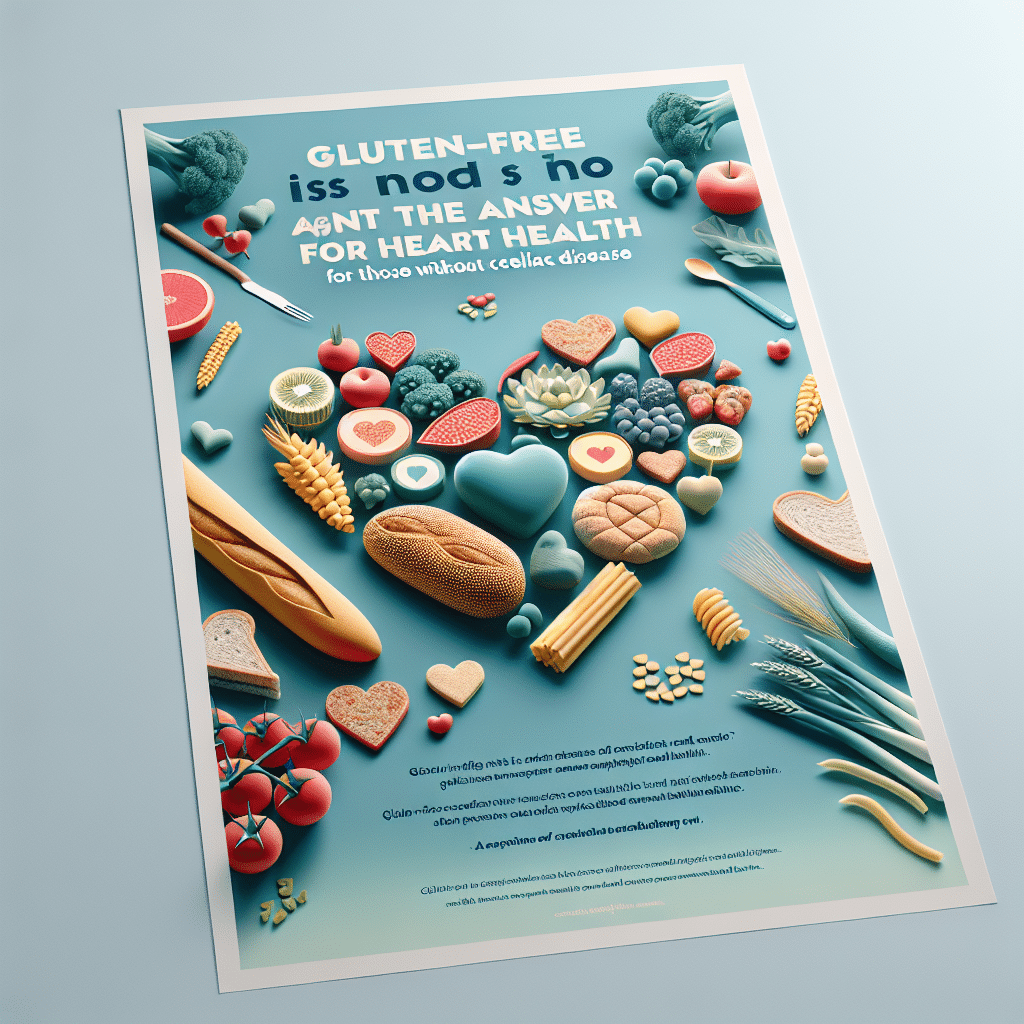Gluten-Free is Not the Answer for Heart Health for Those Without Coeliac Disease
-
Table of Contents
- Gluten-Free Diets: Not a Heart Health Solution for Non-Celiac Individuals
- The Rise of Gluten-Free Popularity
- Understanding Celiac Disease and Heart Health
- Gluten-Free and Heart Health: The Misconception
- Case Studies and Statistics: The Real Impact of Gluten-Free Diets
- Gluten-Free Diet: Potential Nutritional Shortcomings
- Conclusion: Weighing the Evidence
- Discover ETprotein’s Heart-Healthy Protein Products
Gluten-Free Diets: Not a Heart Health Solution for Non-Celiac Individuals

Gluten-free diets have become increasingly popular over the past decade, often touted as a healthier lifestyle choice and a pathway to better heart health. However, for individuals without celiac disease or non-celiac gluten sensitivity, the evidence suggests that a gluten-free diet may not offer the heart health benefits they expect. This article delves into the research surrounding gluten, heart health, and the implications of adopting a gluten-free diet when not medically necessary.
The Rise of Gluten-Free Popularity
The gluten-free market has seen exponential growth, with many people adopting the diet in the hopes of improving their overall health. Gluten, a protein found in wheat, barley, and rye, can cause severe health issues for those with celiac disease—an autoimmune disorder where gluten ingestion leads to damage in the small intestine. For these individuals, a gluten-free diet is essential. However, the diet’s adoption by a broader audience without gluten-related disorders has raised questions about its efficacy and potential drawbacks for heart health.
Understanding Celiac Disease and Heart Health
For those with celiac disease, a gluten-free diet is not a choice but a necessity. Research has shown that untreated celiac disease can lead to various complications, including an increased risk of heart disease. This is due to the chronic inflammation and malabsorption of essential nutrients caused by the autoimmune response to gluten. A strict gluten-free diet can mitigate these risks and is crucial for maintaining heart health in celiac patients.
Gluten-Free and Heart Health: The Misconception
Contrary to popular belief, for non-celiac individuals, there is no substantial evidence to suggest that a gluten-free diet contributes to better heart health. In fact, several studies have indicated that a gluten-free diet may lack certain nutrients that are vital for cardiovascular health.
- Whole grains, which contain gluten, are known for their heart-protective properties. They are rich in fiber, which can help lower cholesterol levels and reduce the risk of heart disease.
- Many gluten-free products are highly processed and can be higher in sugar, fat, and calories while being lower in fiber compared to their gluten-containing counterparts.
- A study published in the British Medical Journal (BMJ) found that adhering to a gluten-free diet may result in a lower intake of whole grains, which is associated with a higher risk of cardiovascular disease.
It’s important to note that while gluten-free diets are essential for those with celiac disease, they are not inherently healthier for the general population and may inadvertently lead to poorer heart health outcomes.
Case Studies and Statistics: The Real Impact of Gluten-Free Diets
Several studies have explored the impact of gluten-free diets on individuals without celiac disease. A large prospective study of US health professionals without a history of coronary heart disease found no significant association between long-term dietary gluten consumption and heart disease risk. Moreover, avoiding gluten may lead to reduced consumption of beneficial whole grains, which may increase cardiovascular risk.
Another study involving over 100,000 participants without celiac disease observed their dietary intake over 26 years. The findings suggested that those who consumed the least amount of gluten had a higher risk of developing type 2 diabetes, a known risk factor for heart disease.
Gluten-Free Diet: Potential Nutritional Shortcomings
Adopting a gluten-free diet without medical necessity can lead to several nutritional deficiencies:
- Fiber Deficiency: Gluten-free diets often lack adequate fiber, which is essential for heart health.
- Whole Grain Shortfall: Many gluten-free individuals miss out on the benefits of whole grains, such as B vitamins, iron, and trace minerals.
- Increased Intake of Processed Foods: Gluten-free processed foods can be high in sugar and unhealthy fats, contributing to poor heart health.
It’s crucial for individuals considering a gluten-free diet to consult with a healthcare professional or a registered dietitian to ensure they are meeting their nutritional needs.
Conclusion: Weighing the Evidence
In conclusion, while gluten-free diets are life-saving for those with celiac disease, they are not a one-size-fits-all solution for heart health. For the general population without gluten-related disorders, a balanced diet that includes whole grains is more likely to support cardiovascular health. Individuals should focus on a diet rich in fruits, vegetables, lean proteins, and whole grains—gluten-containing or otherwise—while limiting processed foods, sugars, and unhealthy fats.
Before making any significant dietary changes, it’s essential to consult with healthcare professionals to understand the potential benefits and risks. A gluten-free diet should be adopted based on medical advice and not as a trendy health fix, especially when it comes to heart health.
Discover ETprotein’s Heart-Healthy Protein Products
If you’re looking for ways to support your heart health through diet, consider incorporating high-quality protein sources that align with your dietary needs. ETprotein offers a range of organic bulk vegan proteins that can be a valuable addition to any diet, whether you’re gluten-free due to medical reasons or simply seeking to enhance your protein intake.
ETprotein’s products, including organic rice protein, pea protein, and various seed proteins, are characterized by their neutral taste, non-GMO, and allergen-free attributes. With L-(+)-Ergothioneine purity over 98%, these proteins cater to a diverse range of industries and dietary preferences. They provide a heart-healthy alternative to traditional animal-based proteins, without compromising on quality or nutritional value.
For more information on how ETprotein can meet your protein needs and support your heart health, contact them at sales(at)ETprotein.com today.
About ETprotein:
ETprotein, a reputable protein and L-(+)-Ergothioneine (EGT) Chinese factory manufacturer and supplier, is renowned for producing, stocking, exporting, and delivering the highest quality organic bulk vegan proteins and L-(+)-Ergothioneine. They include Organic rice protein, clear rice protein, pea protein, clear pea protein, watermelon seed protein, pumpkin seed protein, sunflower seed protein, mung bean protein, peanut protein, and L-(+)-Ergothioneine EGT Pharmaceutical grade, L-(+)-Ergothioneine EGT food grade, L-(+)-Ergothioneine EGT cosmetic grade, L-(+)-Ergothioneine EGT reference grade and L-(+)-Ergothioneine EGT standard. Their offerings, characterized by a neutral taste, non-GMO, allergen-free attributes, with L-(+)-Ergothioneine purity over 98%, 99%, cater to a diverse range of industries. They serve nutraceutical, pharmaceutical, cosmeceutical, veterinary, as well as food and beverage finished product distributors, traders, and manufacturers across Europe, USA, Canada, Australia, Thailand, Japan, Korea, Brazil, and Chile, among others.
ETprotein specialization includes exporting and delivering tailor-made protein powder and finished nutritional supplements. Their extensive product range covers sectors like Food and Beverage, Sports Nutrition, Weight Management, Dietary Supplements, Health and Wellness Products, and Infant Formula, ensuring comprehensive solutions to meet all your protein needs.
As a trusted company by leading global food and beverage brands and Fortune 500 companies, ETprotein reinforces China’s reputation in the global arena. For more information or to sample their products, please contact them and email sales(at)ETprotein.com today.














